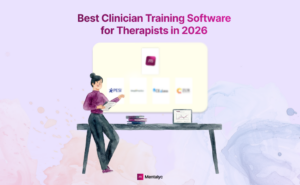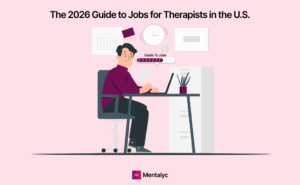Are you ready to take control of the growth of your therapy private practice in a competitive landscape? It's crucial to stand out. This comprehensive guide is tailored specifically for counselors, psychologists, psychiatrists, and social workers like you. It offers proven marketing strategies to enhance your professional outreach and client engagement, covering essential topics from website optimization to mastering social media. Gain the knowledge and tools to attract clients ethically and effectively. Elevate your reputation, captivate your ideal clientele, and confidently expand your business. We also address common challenges in promoting a mental health practice, equipping you to navigate them successfully. Follow these expert tips, and watch your practice thrive with a steady stream of clients.
Let's start with some reflective questions:
How do you currently attract new clients to your business?
Which areas of your practice's marketing need the most improvement?
Optimizing Your Online Presence
Creating your private practice website and enhancing it's search engine visibility ensures it appears prominently in search results instead of being buried. This optimization boosts organic traffic and improves user experience, crucial for attracting potential clients.
Steps to Enhance Your Website's Performance:
1. Keyword Research: Use tools like Google Keyword Planner, SEMrush, or Ahrefs to discover relevant keywords for your specific field, location, and services. Concentrate on keywords with moderate search volume and low competition. 2. 3. Integrating Keywords: Naturally include the identified keywords in your page titles, headings (H1, H2), and throughout your content. Avoid excessive keyword use to maintain readability and authenticity. 4. 5. Content Structure: Organize your content logically with clear headings and subheadings. Use bullet points and short paragraphs to enhance readability. Make sure each page addresses specific client needs and questions. 6. 7. Mobile-Friendliness: Test your website's responsiveness using tools like Google's Mobile-Friendly Test. Optimize images and videos for mobile devices to improve loading speed. 8.
Reflect On:
What impression does your website currently leave on potential clients?
Is your website optimized for mobile devices?
Can visitors quickly find the information they need?
Here are some common challenges along with their solutions:
Challenge: Difficulty in choosing the right keywords. Solution: Use keyword research tools and analyze competitors to refine your keyword strategy. Focus on long-tail keywords that reflect specific client queries.
Challenge: Ensuring fast loading times and mobile responsiveness. Solution: Optimize images and minimize HTTP requests. Use a responsive web design framework like Bootstrap to ensure compatibility across devices.
Tips for Implementation:
Regularly update website content with fresh information and blog posts to maintain relevance.
Monitor website performance using Google Analytics to track visitor behavior and optimize accordingly.
SEO Content Marketing
Producing top-notch, search-engine-optimized (SEO) content is essential for capturing the attention of prospective customers and connecting with them.
Steps to Develop an Effective Content Marketing Strategy:
1. Content Ideation: Brainstorm content ideas based on client FAQs, industry trends, and keyword research. Consider creating blog posts, videos, or podcasts that address common mental health issues or therapy techniques. 2. 3. Content Creation: Write engaging, informative content that speaks directly to your target audience's needs. Incorporate identified keywords naturally into your content while prioritizing value and readability. 4. 5. Content Distribution: Share your content across social media platforms and email newsletters. Encourage engagement through comments, shares, and subscriptions. 6.
Self-Assessment Questions:
What are your unique strengths and specializations that differentiate you from other practitioners?
How can you effectively communicate your value proposition to potential clients?
Typical Challenges and Resolutions:
Challenge: Generating content ideas consistently. Solution: Utilize tools such as BuzzSumo or monitor social media trends to identify popular topics. Repurpose successful content into different formats to reach a broader audience.
Challenge: Balancing SEO requirements with valuable content. Solution: Prioritize providing actionable advice and insights in your content. Use analytics to measure content performance and adjust strategies accordingly.
Tips for Implementation:
Develop a content calendar to plan and schedule content creation and distribution.
Optimize each piece of content with meta descriptions, alt text for images, and internal links to enhance SEO.
Mastering Marketing Channels: Blogs, Vlogs, Shorts, and Podcasts
Consider utilizing different content types to demonstrate your expertise and engage with your audience. You can create blog posts, videos, podcasts, or social media content that tackles prevalent mental health concerns, showcasing your expertise. For example, you may want to share helpful advice like "5 Mindfulness Exercises to Ease Anxiety" or demonstrate cognitive behavioral therapy methods in a video. High-quality content can boost your website's search engine ranking, making it more visible to your intended audience.
Engage and Connect: Building a Strong Online Presence
Now-a-days, therapists must establish a robust online presence. Building a professional website to highlight your expertise, services, and therapeutic methods is essential. Incorporating relevant keywords for better search engine visibility is vital. Engaging with potential clients on social media platforms such as LinkedIn, Instagram, TikTok, and Facebook is also important. Crafting tailored content for each platform and consistently sharing valuable and relatable posts will help establish credibility and connect with the target audience.
Additional Tips:
Keep your website up-to-date and visually appealing.
Increase engagement on social media by sharing valuable content and insights.
Ensure your online presence accurately represents your brand and professional identity.
Maintain consistency in your messaging and visual style across all platforms.
Optimizing Social Media and Content Strategies
To reach more people, use social media platforms to connect with your target audience. Customize your advertising to target specific demographics such as location, age, interests, and behaviors. Create engaging and relevant content that connects with your audience and provides valuable insights and knowledge. Also, consider repurposing your content into different formats like blog posts, videos, or podcasts to increase engagement and expand your reach.
Evaluate Your Approach:
Have you ever tried social media advertising before? If yes, what were the results?
Which specific demographics are you most interested in targeting with your ads?
What unique insights or knowledge can you share that would benefit your audience?
How can you repurpose your existing content into different formats, such as blog posts, videos, and podcasts?
Enhance Your Content Strategy
Cover relevant mental health topics in your field and optimize your posts with specific keywords and compelling calls to action. Promote your content on social media and include links in your email newsletters to increase visibility and engagement.
Share Inspiring Success Stories
Share anonymized success stories from your practice to emotionally resonate with potential clients and showcase your ability to facilitate positive change. For example, highlight how you supported a busy executive in overcoming burnout and marital challenges, helping them achieve personal and professional growth.
Ask Yourself:
What success stories from your practice could you share (while maintaining client confidentiality)?
How can you present these stories to inspire and connect with your audience?
How can you enhance your existing content to engage various client types, and what new content can you create to achieve this?
Be Authentic and Relatable
Feel empowered to embrace and express your authentic self. By sharing your personal experiences, the obstacles you've overcome, and core values, you can connect with others on a deeper level. This openness fosters trust and allows people to relate to you as genuine individuals rather than just professionals. Being sincere and approachable can help you build stronger connections, setting you apart from others who may be more formal and distant.
Reflective Questions:
What personal experiences or values can you share that resonate with your clients?
How can you balance professionalism with authenticity in your communications?
Engage with Your Audience
Remember that social media is more than just advertising your services. It's about building connections, creating a community, and engaging in meaningful conversations. Take the lead in responding to comments, ask thought-provoking questions, and initiate conversations about mental health. This interaction can help you build trust and rapport with potential clients, making them more likely to be interested in what you offer.
Consider This:
How do you currently engage with your audience on social media?
What steps can you take to ensure professionalism while being engaging and approachable?
Connecting with Professionals and Maximizing Online Reach
Network with Other Professionals
Connecting with professionals in related fields, such as primary care physicians, school counselors, social workers, and other mental health experts, is crucial to building a reliable referral network:
Share details about your services and expertise to demonstrate commitment to referrals.
Consider providing educational workshops, seminars, or speaking engagements to raise awareness.
Attend local professional events, workshops, and conferences to expand your network.
Engage actively in community events aligned with your practice's mission.
Join relevant professional associations or online communities to network and learn.
Collaborate and Cross-Promote
Working with other professionals can help boost your brand by sharing endorsements and promoting each other's services. Building partnerships and engaging in cross-promotional activities can enhance your influence and reach.
Identify potential collaborators and explore mutually beneficial partnerships.
Consider how partnerships can amplify your presence and benefit clients.
Develop a Consistent Brand Identity
Remember to maintain visual consistency by using the same logo, color scheme, and typography across all platforms to establish a strong brand identity. Developing a unique tone of voice and messaging for your website and social media profiles is essential to reinforce your brand. This will provide a consistent experience for potential clients and allow them to connect with your brand. Engaging with potential clients on social media platforms like LinkedIn, Instagram, TikTok, and Facebook can significantly expand your reach. Sharing valuable content and insights is crucial for demonstrating expertise and connecting with your audience.
Thoughtful Questions:
Is your website up-to-date and visually appealing?
How can you enhance engagement on social media platforms?
Does your online presence accurately convey your brand and professional identity?
What steps can you take to maintain consistency in your messaging and visual style?
Self-Reflection:
Is your brand identity consistently conveyed across all platforms?
How can you refine your branding to reflect your practice's values and services better?
Maintain Professionalism and Confidentiality
When using social media as a marketing tool, it's essential to maintain professionalism and client confidentiality. Our strategies always adhere to ethical guidelines and HIPAA regulations. We prioritize responsible and respectful social media marketing to ensure your online presence reflects professional integrity. Leveraging the power of social media can help improve your visibility, develop a solid personal brand, and reach individuals needing mental health support. It's crucial to approach social media intentionally and consistently, focusing on providing value to your audience.
Conclusion
Applying the strategies outlined in this guide allows you to develop and execute a strategic advertising plan tailored to your needs and goals. Start by optimizing your online presence and networking within your community. Then, refine your messaging and utilize digital platforms to expand your reach. Effective marketing requires consistency and patience. Focus on providing value through educational content and ethical practices. Trust the process—your ideal clients will find a caring professional ready to support them. Take that first step today. Keep learning, adapt continually, and continue nurturing relationships. By employing the right mix of digital marketing, networking, and branding, you can attract your dream clients while making a difference in your community.
Are you ready to see your practice thrive? With the strategies detailed in this guide, you'll be equipped to improve your online presence, engage effectively with your audience, and build a strong referral network. Remember, successful marketing is about authentic connections. Start today to see meaningful client relationships and a thriving practice. Also, take advantage of your free trial of Mentalyc – an AI tool that creates progress notes in minutes!
FAQ's:
What social media platforms work best?
Utilizing platforms like LinkedIn, TikTok, Instagram, and Facebook can be highly effective for promoting your mental health practice. LinkedIn provides the opportunity to connect with professionals and establish your expertise. Instagram allows you to express your brand's personality through engaging visuals. Meanwhile, Facebook offers the advantage of targeted advertising and fostering a sense of community.
Should I use paid ads?
Prioritize organic content marketing by building a strong website, blog, and social media presence. Once you have established an engaged audience, consider using paid ads to expand your reach.
How can I make my website stand out?
Optimize your website for search engines (SEO) by incorporating relevant keywords, producing high-quality content, and implementing a user-friendly design. Highlight your expertise through engaging blog posts, informative videos, and insightful podcasts. Emphasize your practice's unique qualities to stand out.
How can I build a referral network?
To establish strong connections and grow your network, it's essential to participate actively in local gatherings and work together with fellow healthcare professionals. Holding educational workshops or seminars can also be beneficial. Building genuine relationships with potential referral sources is an investment that pays off in the long run.
What role does branding play?
Creating a strong personal brand is essential for differentiating yourself and connecting with clients. Establish a compelling brand that mirrors your principles, knowledge, and methodology. Ensure your brand is consistent across various channels, including your website and social media.
How can I advertise ethically?
It's essential always to prioritize client confidentiality and adhere to HIPAA guidelines. Avoid misleading claims or promises and instead focus on educating potential clients about your services and qualifications. Transparency and professionalism should be at the forefront of everything you do.
Do you have any low-cost promotion ideas?
Certainly! Utilize no-cost platforms such as blogging, podcasting, and social media. Enhance your website for local SEO and engage with your local community. Consider providing pro-bono services or workshops to increase your visibility. Being resourceful can have a significant impact even with limited funds.
Why other mental health professionals love Mentalyc

“For those who have hesitations … It is a lifesaver. It will change your life and you have more time to be present with your patients.”
Licensed Clinical Social Worker

“Do yourself a favor, make your life easier. Use the tools that are readily available … I found Mentalyc to be one of the best tools that I’ve ever used.”
Licensed Marriage and Family Therapist

“It immediately changed my quality of life, personally and professionally. I went from 3–4 hours a week of notes to 1 hour at most … that alone is invaluable personally and professionally.”
Owner/Independently Licensed Marriage & Family Therapist (LMFT)

“If I were recommending this software to a colleague, I would tell them that it is the best thing that they could do for their practice.”
Licensed Professional Counselor






